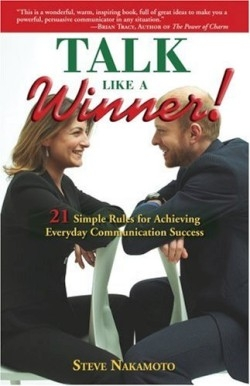Talk Like A Winner!
21 Simple Rules For Achieving Everyday Communication Success
“Basically I’d like to find more ways where we can party with the chicks in the girls’ dorms” the author once said in a speech before a college election. “That’s really what we all want isn’t it? Uhh…I guess that’s about it.”
This is not the stellar speech one would expect from the author of a book called Talk Like a Winner. Steve Nakamoto shares his embarrassing communication failures and explains what he has learned and how he could have handled past situations differently.
Talk Like a Winner covers Nakamoto’s twenty-one rules for successful communication by devoting a chapter to each rule. Each chapter gives a definition for the rule personal anecdotes from the author’s experiences and exercises for improving proficiency in that particular area.
Some of the topics covered may seem like common sense such as assessing a situation to determine the tone of conversation and becoming a better listener so that everyone has a chance to speak. However Nakamoto manages to provide tips and ideas that readers probably wouldn’t otherwise think of trying.
The author has gained his current communication prowess not only by learning from painful mistakes but also by stepping out of his comfort zone and approaching new situations with an open mind. He has received two Writer’s Digest International Book Awards for his other books Dating Rocks! and Men Are Like Fish. He was also a human relations and communications instructor for Dale Carnegie and Associates and served as a neuro-linguistic programming (NLP) personal development trainer for Tony Robbins for seven years.
“…It might be wise to admit what you don’t know as well as what you do know about any given subject” Nakamoto says about choosing what to share in a conversation. We’ve all known someone who seems to know something about everything no matter how obscure the topic. It can be annoying to converse with these types of people but we might not recognize when we do it ourselves. This section of the book gives good tips for breaking annoying conversation-killing habits like these.
Ending a conversation can be just as difficult as starting one. If you don’t think about how to close a conversation you can inadvertently leave a bad impression. Nakamoto shares an experience he had with a professional volleyball player: “…I thanked the pro for his time and input. But what I remember most from our interaction was that he didn’t reply to me by saying… ‘You’re welcome’ … instead he simply turned and walked away from me.”
The book offers lots of useful tips exercises and techniques for those just beginning to explore communication techniques rather than more experienced communicators.
Some of the advice and tips are a little cliché but the overall quality of the book is good. Talk Like a Winner is recommended to those interested in working on relationships and communication dynamics.
Disclosure: This article is not an endorsement, but a review. The publisher of this book provided free copies of the book and paid a small fee to have their book reviewed by a professional reviewer. Foreword Reviews and Clarion Reviews make no guarantee that the publisher will receive a positive review. Foreword Magazine, Inc. is disclosing this in accordance with the Federal Trade Commission’s 16 CFR, Part 255.

